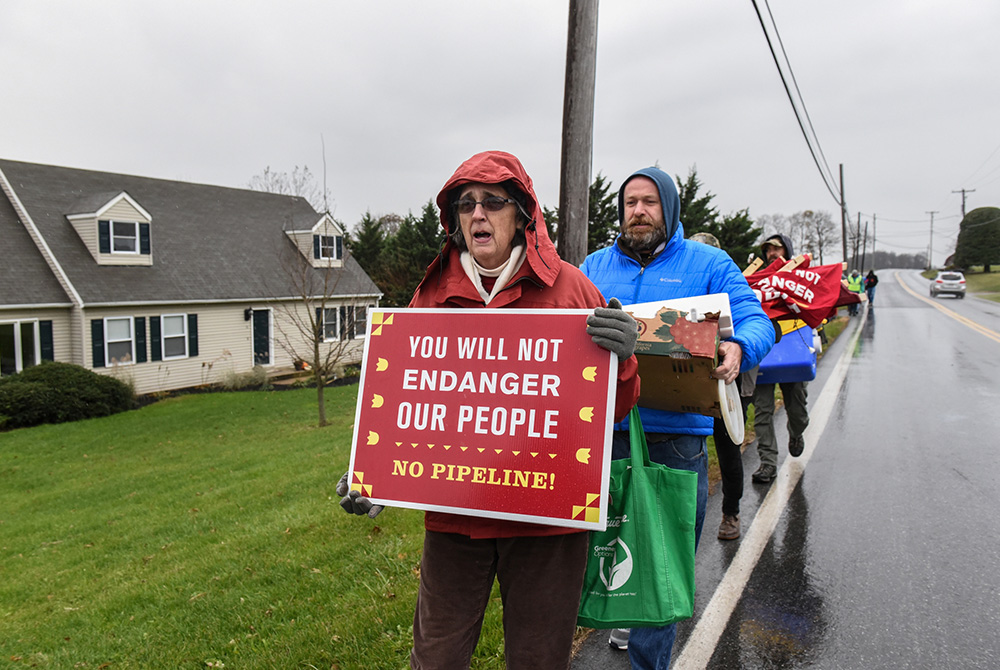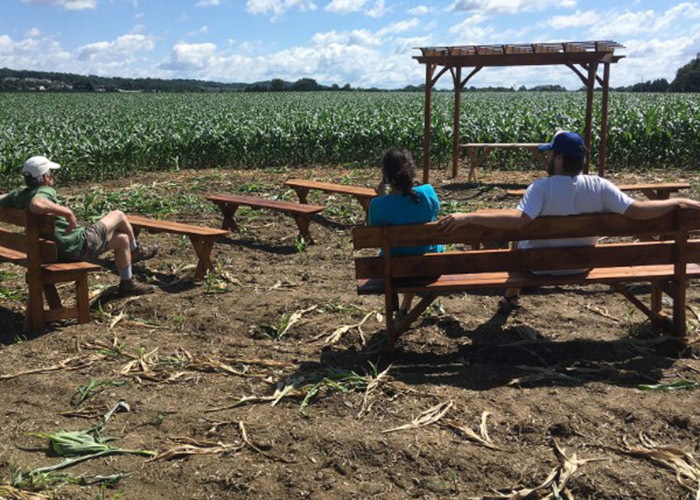
Protesters walk near a construction site of the Atlantic Sunrise pipeline Nov. 18, 2017, in Holtwood, Pennsylvania. (CNS/Stephanie Keith, Reuters)
A congregation of women religious who attempted to stop a natural gas pipeline from crossing their land by building a chapel in its path is now seeking damages in court from the energy company that constructed it.
The Adorers of the Blood of Christ filed a civil lawsuit in November in federal district court against Transcontinental Gas Pipe Line Co., or Transco, an Oklahoma-based subsidiary of The Williams Companies, Inc.
In August 2017, Transco seized land owned by the sisters in Lancaster County, Pennsylvania, under eminent domain to build a 183-mile extension of the Atlantic Sunrise pipeline. The pipeline, which runs more than 10,000 miles from New York to Texas, went into full operation in October 2018.
The latest lawsuit, filed in the U.S. District Court for the Eastern District of Pennsylvania, seeks unspecified monetary damages for the pipeline's construction, which the Adorers say violates their ability to live out their religious beliefs around caring for creation because it transports natural gas — one of the main fossil fuels that drives global warming — and will contribute to climate change.
In 2005, the sisters created a land ethic in which they recognized the earth as sacred and committed themselves, in their religious beliefs and practices, not to harm the earth in their use of the land. Ten years later, Pope Francis issued his encyclical "Laudato Si', on Care for Our Common Home," in which he stated it is an essential part of the Christian faith to preserve the earth for current and future generations, including by limiting climate change.
In a statement at the time the suit was filed, Sr. Janet McCann, a member of the congregation's leadership team, said the land ethic is not just a statement of beliefs. "This vow and commitment to living out our faith requires us to take a public stand when necessary to address actions that violate our Catholic beliefs and teachings."
The Adorers joined other Lancaster landowners in opposing the Atlantic Sunrise pipeline. In July 2017, they attempted to block the natural gas pipeline by constructing a chapel along the path where it was set to cross their property.

People sit at an outdoor chapel on the property of the Adorers of the Blood of Christ in 2017 in Columbia, Pennsylvania. (CNS/Mark Clatterbuck, courtesy of Lancaster Against Pipeline)
Transco has asked that the new case be dismissed. On Feb. 18, District Court Judge Jeffrey Schmehl heard oral arguments on that request. No timeframe was set for a decision. Should the case proceed, it would go before a jury.
The lawsuit is the sisters' second effort in federal courts to take action against the Atlantic Sunrise pipeline under the Religious Freedom Restoration Act.
In February 2019, the U.S. Supreme Court declined to hear the sisters' case, letting stand lower court rulings that said the courts did not have jurisdiction and that the Adorers should have appealed, under the Natural Gas Act, to the Federal Energy Regulatory Commission to stop the pipeline.
In his September 2017 ruling in that case, Schmehl said that even if the sisters had followed proper procedure, the court was not authorized to hear the case. In an earlier ruling, Schmehl said the Adorers had not provided enough evidence that the fossil fuel pipeline crossing their land violated their religious freedom.
The new lawsuit again relies on the Religious Freedom Restoration Act, but instead of attempting to block the pipeline, it seeks a monetary award from Transco for its "prior and continued violation" of their religious freedom.
The act is the law that has been used by religious institutions, like the Little Sisters of the Poor, along with for-profit corporations, such as Hobby Lobby, to oppose a federal mandate to provide access to contraceptives through employee health plans, on the grounds that the mandate violates their religious beliefs.
Advertisement
Dwight Yoder, the attorney representing the Adorers, told EarthBeat this case is "fundamentally different" from the sisters' first lawsuit. It argues that federal courts do have jurisdiction, because neither the Federal Energy Regulatory Commission nor the courts that review its decisions have authority to award damages. Along with that, he said, the religious freedom act's wording makes clear that the concept of violation of religious liberty should be interpreted broadly.
"Those two points taken together, in our opinion, resolve the issue that the court does have jurisdiction and the case should be allowed to proceed," Yoder said.
He added that the Adorers have not requested a specific damage award, but that if the court determines that the pipeline's operation on their land violates the sisters' religious beliefs "in perpetuity," the amount could be "significant."








